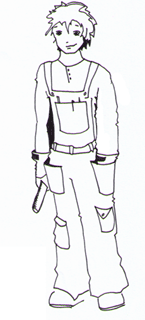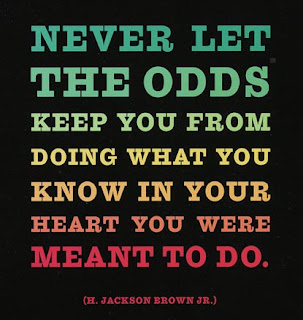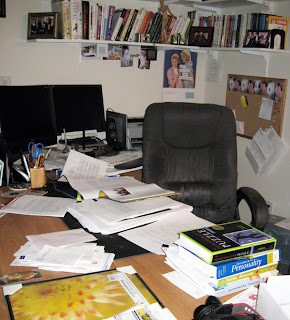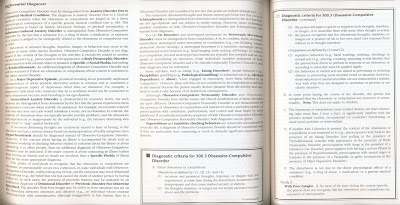Blog chain time again! This time, the question was posed by Kate Karyus Quinn, who asked
How as a writer find do you find the balance between being having too much or too little confidence in your work?
Let me start with the confidence. When I've written something, and the words have just
flowed, I sometimes feel like I'm looking down on the Seventh Day, basking in the warmth of my creation and proclaiming,
It Is Good. I'll feel like I've captured the emotion and the angst; or the flavor, color, and texture of
the world I envisioned. The characters will be
as real as Real People to me. I'll feel that glow in my chest:
Of course I'm a writer. This is something I was meant to do.
Now, as a psychologist, I believe it's not only okay, it's
healthy to be able to say to yourself, "I did a good job on that." "I'm a good writer." You don't have to announce it to the world (in fact, you probably shouldn't!), but you're healthier if you have a secret little place inside with a nice big refrigerator to put up your accomplishments, and where you can nod and pat yourself on the back and think,
I Did Good. I even have lots of professional terms to make that all sound more authoritative, like
self-esteem,
self-efficacy, and
adequate mirroring on the Grandiose Pole. But I'm going to skip all that for right now.
If feeling good about what you'd written was as far as any of this went, all would be well. But so many of us have this urge, this drive, this
need to get published. And what is that all about anyways? Few people make money publishing. It's cool, but unless you're Stephenie Meyer or JK Rowling or whoever this week's Hot Writer is, it's a passing cool that others soon forget. Getting published doesn't make you beautiful or thin or get you a Happily Ever After with whichever celebrity you drool over most.
Yet the need remains. So you sweat blood over a query and open a vein to get the synopsis right and then, hoping, praying,
believing you've got something others will love, you start sending your work out to others.
Some writers start with crit buddies, some jump straight to agents and publishers; some do both simultaneously. And most soon discover that not everyone else thinks their work is so good.
According to Robert Heinlein,
that's where a lot of people quit. In fact, he believed that
only half the writers who actually put pen to paper (or words to screen) and finish what they start have the guts to submit to agents and publishers.
Writers...are inordinately fond of their brainchildren. They would rather see their firstborn child ravaged by wolves than suffer the pain of having a manuscript rejected. So instead they [only] read their manuscripts aloud to spouses and long-suffering friends.
But
you're not satisfied to believe the friends and family who swear your work is fantastic --
you have to send your work out to people outside that little circle. And as the crits roll in and the rejections pile up, you look at your work with fresh eyes, and you realize it's miserable. It's embarrassingly horrible.
You're embarrassingly horrible, and stupid besides to ever have believed someone else might be interested in the ridiculous stories you make up in your head.
Lather, rinse, repeat. Crit after crit, rejection letter after rejection letter.
Some throw in the towel right away. "The world just isn't ready for my material," they sniff, or they decide that all agents are self-important assholes who wouldn't know a good story if it ran them over. There are even
websites that exist for the purpose of ranting about your rejections and throwing mud back at the agents who sent them. (Who are, by the way, human beings who are just doing their jobs as best they can. But that's another blog post.)
Other writers are worn down over weeks, months, or years of querying. Or by disapproving relatives. Or by savage critique "buddies." The rejection hurts. A lot.
But some always manage to drag themselves out of the dirt, brush themselves off, and try again. Just like they
need to write, they
need to keep trying to get published.
"Writing is a calling," says editor Betsy Lerner. "If the call subsides, so be it. [But] when writers say they have no choice, what they mean is:
Everything in the world conspired to make me quit, but I kept going." She goes on:
Many writers have gathered their marbles and gone home for far less cause. It takes a supreme talent and fierce self-belief to write in the face of such acrimony... If the high wire is for you, if the spotlight is for you, if you believe that everyone should pay attention to you and your work, then you must stay focused. Ambivalence will never get you anywhere.
What it comes down to, I've read over and over again, is
determination in the face of all that feedback, all those rejections. A willingness to learn, of course, but also determination to overcome and succeed:
- The degree of one's perseverance is the best predictor of success - Betsy Lerner
- In all manner of pursuits there's a tendency to overesimate brilliance and underestimate persistence. Talent is common. Determination is rare. -Ralph Keyes
- [The authors of the Chicken Soup books] instinctively understood that all those rejections were simply an uncomfortable part of the process that would eventually get them where they wanted to be. - literary agent Jeff Herman
- [Author of One Flew Over the Cuckoo's Nest Ken] Kesey was not even remotely the best writer in class [at the writing program at Stanford], but he was maniacally determined. - Classmate and writer Thomas McGuane
- Talent is extremely common. What is rare is the willingness to endure the life of a writer - Kurt Vonnegut, Jr.
So where do you find the determination? According to Keyes, you have to hate the idea of being ignored, of never being read, more than you hate the pain of rejection. "It is some combination of ability and ego," adds Lerner, "desire and discipline, that produces good work." She continues:
A writer's success or faltering can usually be traced to some abundance or deficit of those elements. Some of the most gifted writers I've worked with were also the most self-sabotaging. Lack of discipline, desire for fame, and depression often thwart those whose talents appear most fertile, while those who struggle with every line persevere regardless.
In many ways, learning to deal with rejection from agents and publishers is just the first step. Because when you do manage to get published, you will have to deal with critics, the bloodthirsty pirahna in the sea of your success. People who have sudden, overwhelming success, are not prepared for it. And
that may topple them and keep them from producing good work going forward. So keep running that gauntlet, and be proud of your calluses and scars, because they mean you believed in yourself enough to keep going.
Don't forget to check out
Kate's post before mine -- it's a joy to read! And then hop over to
Michelle McLean's blog and see how she manages that delicate balance between too much and too little confidence!


































